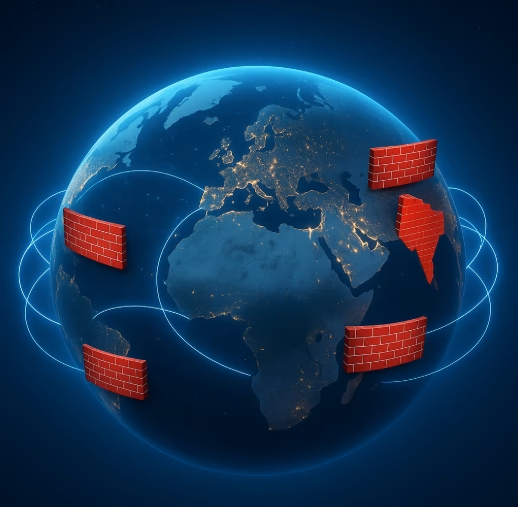Once upon a time, the internet was imagined as a borderless realm — a vast digital commons where ideas, innovation, and opportunity could flow freely. But today, that dream is fracturing. Firewalls are rising where fiber optics once promised freedom. Nations are no longer just competing for wealth or weapons — they’re racing to control code, clouds, and cables.
Nowhere is this clearer than in the BRICS countries. Together, they represent more than half the world’s population — and they are building their own version of the internet. Not just new platforms, but entire systems of data governance, infrastructure, and information control, independent of Western oversight.
Their reasons sound noble: sovereignty, resilience, fairness. But make no mistake — this is not just about escaping censorship. It’s also about building tools to enforce it on their own terms. In the name of independence, we may be watching the internet splinter into a world of walled gardens — and gated nations.
Now, the BRICS nations — that’s Brazil, Russia, India, China, and South Africa for you folks who skipped geography — have decided they’ve had enough of the puppet strings. They want to build their own internet. Their own cloud. Their own rules. Sounds noble, don’t it? Like a digital Declaration of Independence. But before you go hollering’ about digital freedom, let me tell you — the fellas building the cage might just be planning to lock the door from the inside., And you thought the deep web was the only thing you had worry about.
The global internet is no longer a single network. It is a mosaic of competing visions — some open, many controlled, all consequential. The BRICS countries say they are building for sovereignty, but sovereignty without liberty is simply control by a different name.
We are approaching a future where every major power has its own internet, its own rules, its own walls. What began as a global commons is now a patchwork of digital empires, each guarded by its own cyber border patrol.
The question is not whether BRICS can build their own internet. They can, and they are. The question is: what values will be embedded in its code? Will it serve the people — or the power? The decisions made now will define not just the architecture of the internet, but the shape of global freedom in the decades to come.
In the end, it ain’t about who owns the wires — it’s about who controls the truth flowing through them. So when you hear talk of a “new internet,” ask yourself: is it a road to freedom… or just another prison with a prettier view?
Let’s take a deeper dive into this new developing cyberspace.
“The internet was meant to set us free. Now it’s being rebuilt to put us in digital cages — just painted in different colors.”
The Global Digital Fork in the Road
In the 1990s, the internet was heralded as the great equalizer — a borderless domain of free expression, innovation, and global connection. But as power consolidated in the hands of a few Western tech giants, cracks began to show. Today, the internet is less a utopia and more a battleground, with nations scrambling to control what was once open. And nowhere is this more apparent than in the ambitious digital vision of the BRICS nations — Brazil, Russia, India, China, and South Africa.
What began as a call for economic balance has evolved into a demand for technological independence. BRICS countries are not just seeking an alternative to the SWIFT banking system — they are now calling for an alternative internet, one free from U.S. oversight. But beneath the cries for sovereignty lies a complex question: Is BRICS building digital freedom, or simply replacing one gatekeeper with another?
The Stated Goal: Digital Sovereignty
The public rationale is clear: BRICS countries say they need to reduce dependency on U.S.-based platforms like Google, Microsoft, Amazon, Meta, and Apple. These companies own and operate most of the world’s:
- Cloud infrastructure
- Data centers
- Subsea internet cables
- Mobile app ecosystems
- Email, DNS, and core internet protocols
During geopolitical crises — such as Russia’s invasion of Ukraine — these services were swiftly pulled. Apps, payment systems, and updates were disabled not by governments, but by corporations aligned with Western political interests.
The BRICS nations saw this and drew a simple conclusion: If your entire digital life runs through someone else’s servers, you’re not sovereign — you’re vulnerable.
The Real Agenda: Control, Not Just Freedom
But let’s not be naive. The claim that BRICS is seeking to “prevent censorship” by creating its own internet is ironic at best and disingenuous at worst.
Most BRICS governments are already among the world’s leading internet censors.
- China built the Great Firewall and heavily filters everything from search results to messaging apps.
- Russia passed laws requiring data localization and now promotes a sovereign internet that can be shut off from the rest of the world.
- India has imposed internet blackouts in places like Kashmir — the longest ever recorded in a democracy.
- Brazil and South Africa lag in infrastructure but are toying with increased content moderation laws.
So the move to build independent digital ecosystems isn’t just about resilience or fairness. It’s also about consolidating internal control under the guise of sovereignty.
In short: The BRICS nations aren’t just protecting their citizens from Western censorship — they’re preparing to amplify their own.
The Technical Vision: Infrastructure, Not Just Ideals
Still, the technical vision is ambitious and — if executed well — potentially game-changing. Here’s what the BRICS bloc is working on:
- Independent DNS and root servers
- Subsea cable networks not routed through U.S. allies
- Domestic cloud providers and chip manufacturing
- Digital public infrastructure like India’s Aadhaar
- Unified cyber security alliances
- Open-source alternatives to Google, Facebook, and Microsoft
This would allow BRICS nations to insulate themselves from U.S. sanctions, control their data, and craft laws tailored to local values (however oppressive or liberating those may be).
But Beware the New Digital Authoritarianism
What’s concerning is how closely BRICS’ strategy mirrors digital authoritarianism already practiced by some of its members.
- China’s model is built on surveillance, algorithmic control, and social credit scoring.
- Russia’s model leans on state security monitoring and website shutdowns.
- India, despite its democratic status, has shown signs of tech-enabled populism and repression.
If BRICS is merely replicating the centralized, opaque, surveillance-heavy model of Western tech — just hosted on different soil — then we’re not moving forward. We’re sliding sideways into a new form of digital feudalism, where data is still power, but now held by different hands.
A Better Path: BRICS as a New Digital Vanguard?
But there’s another possibility.
If BRICS nations reject both U.S. tech hegemony and their own worst authoritarian instincts, they could build something genuinely new:
- Open-source standards with community governance
- End-to-end encryption and data portability
- Decentralized infrastructure
- Transparent algorithm auditing
- Legal protections for whistleblowers, journalists, and dissidents
They could champion digital rights as a fundamental component of sovereignty, not a threat to it.
That is the best-case scenario — and it’s still within reach.
The Stakes: A Fractured Internet or a Fairer One?
The internet is no longer one world. It is becoming a patchwork of digital fiefdoms, divided by firewalls, trade alliances, and political fault lines. AI, chip supply chains, and quantum computing will only deepen these divides.
The future is being written in code and policy — right now.
If BRICS acts with unity and vision, it can influence the next generation of digital norms. But if it simply builds a parallel system to exert its own control, the world will not become more free. It will become more fragmented, more surveilled, and more dangerous.
The Great Digital Reboot
“You don’t free the people by changing the color of the cage.”
BRICS is right to seek independence from Western digital infrastructure. But the test of its integrity will not be whether it builds a new internet — but what kind of internet it builds.
If it becomes just another tool of control, then the global South will trade one master for another. But if it dares to innovate ethically — to embed freedom, fairness, and transparency in its code — then maybe, just maybe, we’ll see the dawn of a better internet for all.
© 2025 insearchofyourpassions.com - Some Rights Reserve - This website and its content are the property of YNOT. This work is licensed under a Creative Commons Attribution 4.0 International License. You are free to share and adapt the material for any purpose, even commercially, as long as you give appropriate credit, provide a link to the license, and indicate if changes were made.








